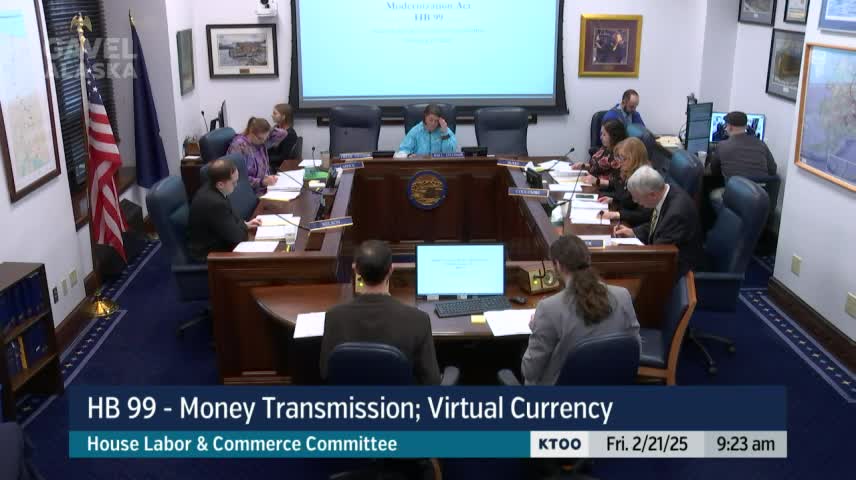Committee reviews House Bill 99 to modernize Alaska money‑transmission law and add crypto provisions
Get AI-powered insights, summaries, and transcripts
Subscribe
Summary
House Bill 99 would overhaul the Alaska Uniform Money Services Act (AS 6.55), expand licensing and examination powers, add virtual‑currency provisions and set a Jan. 1, 2026 effective date; the Division of Banking and Securities told the committee the update aims to protect consumers and reduce regulatory gaps as mobile payments and crypto grow.
The House Labor and Commerce Committee heard an introductory presentation on House Bill 99 on Feb. 21, 2025, a departmental bill that would modernize Alaska’s money‑transmission statute to explicitly cover virtual currency, expand licensing and record‑keeping requirements, and give the Division of Banking and Securities broader examination and enforcement authority.
Representative Zach Fields, the bill sponsor, said HB 99 updates Alaska’s framework to “bring [it] in line” with modern payment systems and to give state regulators tools to combat criminal misuse of virtual currency. “This is a crime fighting bill, and we are just giving the department the tools they need,” Fields said.
Tracy Reno, chief of examinations for the Division of Banking and Securities (DBS), walked the committee through adoption rationale and data showing rapid growth in mobile payments and crypto transmission. Reno said the division recorded money‑transmission volumes that grew from about $1.6 billion in 2019 to more than $7 billion in 2021, with annual volume of about $4.5 billion in 2023. “Alaskans use money transmission, particularly mobile payments like Cash App and Venmo, thousands of times an hour to transfer billions of dollars each year,” Reno said. She told members the current act dates from 2007–08 and predates smartphone‑based payments and most virtual currencies.
Evan Anderson, staff to Representative Fields, summarized the bill’s structure: it replaces the currency‑exchange license with a single money‑transmission license that includes virtual‑currency activity; requires criminal background checks for senior management; extends record‑keeping from three to five years; requires annual audited financial statements within 90 days of a licensee’s fiscal year end; adopts tiered net‑worth and prudential standards to replace a flat $25,000 minimum; and creates transitional provisions for existing licensees. The sectional analysis included a proposed effective date of Jan. 1, 2026.
Reno and DBS Director Robert Schmidt told the committee the draft also ensures that, in the event of an exchange bankruptcy, customer crypto balances would be treated as the customer’s property rather than an exchange asset — a point tied to consumer losses in the collapses of major exchanges in 2022. “This bill contains a specific provision regarding crypto that a crypto account is the property of the customer,” Reno said.
Members asked for examples of transmission types (Reno and examiner Dean Fleer described mobile‑payment apps such as Venmo and Cash App as money transmission; cryptocurrency examples included Bitcoin and Ethereum; stored‑value cards were illustrated by retail‑sold reloadable cards). Representative Sadler asked whether federal regulatory changes might make state updates obsolete; Director Schmidt argued the states retain a central role in money‑transmission oversight and said the current federal posture supports continued state regulation.
Committee discussion did not result in a vote. Representative Hall noted time constraints and the committee chair set HB 99 aside for further consideration at a later date. Staff indicated the bill had been introduced in prior sessions and that near‑identical companion measures had reached Senate Rules and House Finance in the previous year without final passage.
Committee members signaled the need for detailed follow‑up work on technical provisions, including examination cost recovery, fee schedules linked to in‑state transmission volume, and operational questions about authorized delegates (agents) and confidentiality/examination procedures.
